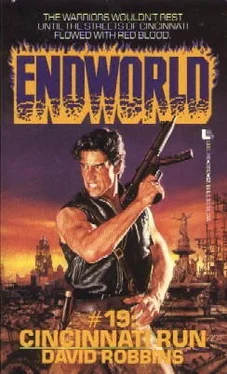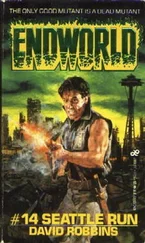David Robbins - Cincinnati Run
Здесь есть возможность читать онлайн «David Robbins - Cincinnati Run» весь текст электронной книги совершенно бесплатно (целиком полную версию без сокращений). В некоторых случаях можно слушать аудио, скачать через торрент в формате fb2 и присутствует краткое содержание. Город: New York, Год выпуска: 1989, ISBN: 1989, Издательство: Leisure Books, Жанр: sf_postapocalyptic, Боевая фантастика, на английском языке. Описание произведения, (предисловие) а так же отзывы посетителей доступны на портале библиотеки ЛибКат.
- Название:Cincinnati Run
- Автор:
- Издательство:Leisure Books
- Жанр:
- Год:1989
- Город:New York
- ISBN:978-0843928921
- Рейтинг книги:3 / 5. Голосов: 1
-
Избранное:Добавить в избранное
- Отзывы:
-
Ваша оценка:
- 60
- 1
- 2
- 3
- 4
- 5
Cincinnati Run: краткое содержание, описание и аннотация
Предлагаем к чтению аннотацию, описание, краткое содержание или предисловие (зависит от того, что написал сам автор книги «Cincinnati Run»). Если вы не нашли необходимую информацию о книге — напишите в комментариях, мы постараемся отыскать её.
Cincinnati Run — читать онлайн бесплатно полную книгу (весь текст) целиком
Ниже представлен текст книги, разбитый по страницам. Система сохранения места последней прочитанной страницы, позволяет с удобством читать онлайн бесплатно книгу «Cincinnati Run», без необходимости каждый раз заново искать на чём Вы остановились. Поставьте закладку, и сможете в любой момент перейти на страницу, на которой закончили чтение.
Интервал:
Закладка:
“No.”
“Does Sundance talk like the Sundance Kid?”
“No.”
“Does Samson use biblical language?”
“No.”
“Does Teucer speak Greek?”
“No.”
“And what about Plato?”
“What about him?” Hickok retorted. “He uses so many blamed highfalutin words, I never know what in Sam Hill he’s talkin’ about.”
“Okay. Forget Plato. But you get my point. All of us went through the Naming ceremony instituted by the Founder. All of us had the option of researching the history books in the library the Founder stocked and picking the name of any historical figure as our own. We can take our name from other sources, if we wish—”
“Tell me something I don’t know,” Hickok quipped.
Geronimo ignored the dig. “The Founder initiated the Naming ceremony as a way of insuring we never lose sight of our historical roots.
He didn’t intend for us to completely copy our heroes in every respect.”
“Are you referrin’ to me?”
“Who else is a living dictionary of the Wild West?”
“Is that what I am?” Hickok asked, and smiled. “Gee. I’m flattered.”
“Boys,” Blade stated with special emphasis, interrupting their banter.
“We’re expected.”
Hickok and Geronimo faced front.
The SEAL was still 500 yards from the tents and shacks. There appeared to be about a dozen of each, lined in uneven rows on both sides of the cracked, pitted, pothole-dotted highway. They passed a faded, rusted sign indicating the road was once known as Highway 24.
“Look at ’em all,” Hickok said.
Over three dozen men, women, and children were milling about the encampment. Most wore tattered clothing. Many of the men and women carried weapons, either a rifle, a revolver, or both. Five men were standing in the roadway, strung out across Highway 24, watching the transport approach. All five held rifles.
“Are they the welcoming committee?” Geronimo queried.
“Looks that way,” Blade said.
“Let me talk to them,” Hickok proposed.
“I’ll do the talking,” Blade replied.
“Why you?”
“For two reasons,” Blade answered. “One, you’re likely to gun them down before we find out what they want.”
“And what’s the second reason?”
Blade glanced at the gunman. “I said so.”
Hickok shrugged. “You’re the head honcho.”
“They look like scavengers,” Geronimo commented, “but scavengers never stay in one place.”
“Maybe they’re startin’ their own town,” Hickok speculated.
“In the middle of nowhere?” Geronimo said.
“Some folks have no common sense, pard.”
Geronimo gave the gunman a meaningful look. “Don’t I know it.”
Blade applied the brakes lightly when the SEAL was 40 yards from the five men. He allowed the transport to glide forward slowly, his eyes on the quintet of hardcases. A glint of sunlight off to the right arrested his attention, and he saw several antiquated vehicles parked in a stand of trees to the south of the tents and shacks. The afternoon sun was gleaming off the front bumper of a white car. Although the bumper and grill were visible, the car’s body was obscured by dense brush. For that matter, all of the vehicles were partially screened by undergrowth. Blade’s eyes narrowed.
Wait a minute.
Were those vehicles parked in the trees—or hidden there?
“Everyone is lookin’ at us,” Hickok observed.
All of the people in the camp had ceased whatever they were doing and were staring at the SEAL.
“This setup is definitely a trap,” Blade announced. “We’ll let them make the first move.” He rolled down his window.
Hickok was doing the same. He placed the AR-15 between his legs, drew his Pythons, and held the revolvers next to the passenger-side door, just below the edge of the window.
The transport was now ten yards from the bedraggled men, none of whom displayed the slightest inclination to move aside.
Blade brought the SEAL to a stop six feet away and poked his head out the window. “Hello,” he said with a smile.
“Hi, stranger,” declared the man in the middle, a hefty fellow with a cleft chin and bushy brows. He wore a torn flannel shirt and baggy brown pants, and in his hands was a Winchester 30-30. “Nice van you have here.
Never saw one like it before.”
“It’s special,” Blade said.
“Is that so?” Hefty responded, smiling in a friendly fashion.
“Would you happen to have fresh venison you’d be willing to trade?”
Blade inquired politely. “We’ve been eating jerky for the past two days and could use a change.”
Hefty nodded and came around the front of the SEAL to stand near Blade’s window. “Yep. Just killed an eight-point buck this morning.
There’s lots of deer in these parts.”
Blade allowed his left arm to casually dangle out the window while gripping the Commando with his right hand. “You have a lot of mouths to feed,” he remarked.
“We truly do,” Hefty acknowledged. “And it ain’t easy, let me tell you.”
Blade pointed at the encampment, which began approximately 15 yards to the rear of the men. “Are you their leader?”
“You could say that,” Hefty admitted with a smirk.
“How long have you been camped here?”
“Oh, a couple of months.”
“I’m surprised to find your camp near the highway, in the open,” Blade said. “Aren’t you concerned the Russians might discover it?”
“The Reds don’t come this far north much,” Hefty said. “We’ve seen a helicopter or two of theirs, but they left us alone. Didn’t want to waste the ammo, I guess.”
Blade stared at the man. “What would you take in trade for some fresh venison?”
“Do you have any guns in there?” Hefty asked, tilting his head and trying to peer inside.
“We won’t trade guns,” Blade said.
“What will you trade, stranger?”
“We have a spare canteen, several boxes of matches, and a hatchet,” Blade disclosed. “Would you be interested in any of those?”
“We could use all of it.”
“I’ll trade you the canteen and a box of matches for three venison steaks,” Blade offered.
Hefty made a show of scratching his stubbly chin. “Throw in the hatchet.”
“The hatchet and a box of matches,” Blade amended.
“No. We’ll take the canteen, the matches, and the hatchet,” Hefty said.
“We don’t need the entire buck,” Blade said wryly.
Hefty grinned. “You’re a tough customer, that’s plain to see.” He nodded toward the encampment. “Tell you what. Why don’t you and whoever else is in that contraption come out and join us in a brew. We can talk over the trade cordial-like.”
“Don’t mind if we do,” Blade said, and he saw the five men visibly relax.
They were undoubtedly convinced they had pulled the wool over his eyes.
“Just park your van over there,” Hefty said, indicating a patch of grass between two tents.
“All right,” Blade said, then paused. “Say, I’ve been meaning to ask you a question.”
“What’s that, stranger?”
“I couldn’t help but notice those vehicles in the trees,” Blade said innocently. “Where did they come from?”
Hefty frowned. “You’re real observant, mister.”
“Are they yours?” Blade inquired.
“Yeah,” Hefty said, glancing at his four companions.
“Why are they parked in the trees?” Blade pressed him.
“Uhhhh,” Hefty began, his forehead creasing. “We don’t want the Reds to spot them.”
“But you just said the Russians rarely travel this far north of their lines,” Blade stated.
“You never know,” Hefty responded nervously.
Читать дальшеИнтервал:
Закладка:
Похожие книги на «Cincinnati Run»
Представляем Вашему вниманию похожие книги на «Cincinnati Run» списком для выбора. Мы отобрали схожую по названию и смыслу литературу в надежде предоставить читателям больше вариантов отыскать новые, интересные, ещё непрочитанные произведения.
Обсуждение, отзывы о книге «Cincinnati Run» и просто собственные мнения читателей. Оставьте ваши комментарии, напишите, что Вы думаете о произведении, его смысле или главных героях. Укажите что конкретно понравилось, а что нет, и почему Вы так считаете.












